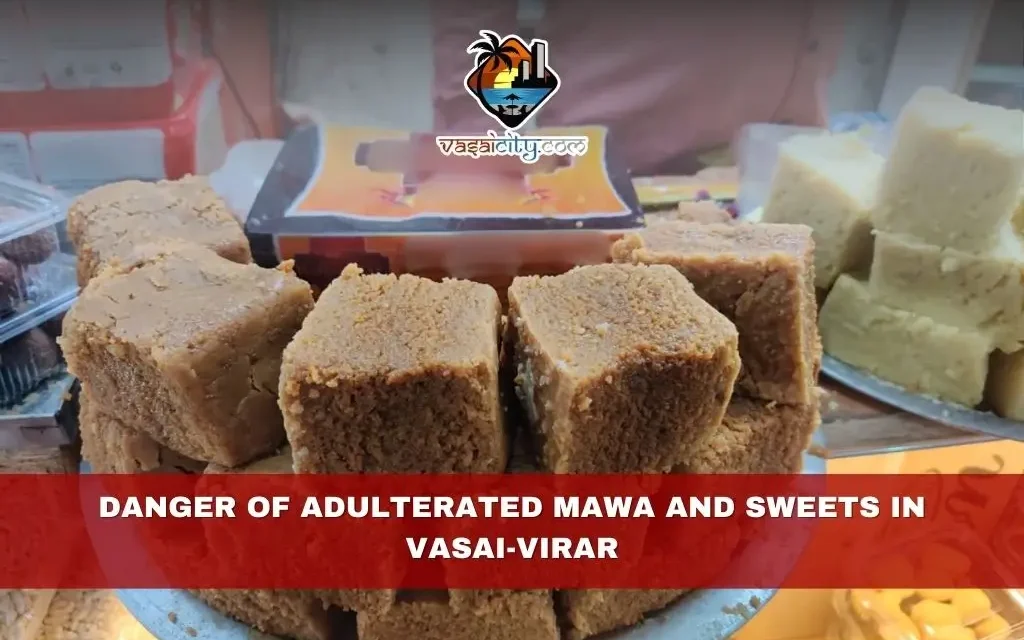As the festive season kicks off in Vasai-Virar, a new concern looms large over the community: the sale and distribution of adulterated mawa, a crucial ingredient in many traditional sweets. With an increase in sweet consumption during festivals, the influx of fake mawa, used in various sweets, is putting public health at risk. Despite this, there has been little action from the Food and Drug Administration (FDA) to address the issue, raising questions and concerns among locals about the safety of the food they consume.
Local residents are alarmed, as adulterated mawa continues to be sold openly. Citizens are now urging the FDA to take immediate action against shopkeepers and distributors involved in this trade. A lack of enforcement has left many feeling vulnerable, as they question the safety of the sweets widely available in local shops.
According to sources, a significant quantity of counterfeit mawa has already been distributed across the Vasai-Virar area, with much of it ending up in sweet shops where it’s then used to make various confections. Sweets made from adulterated mawa can pose serious health risks, leading to potential digestive problems, food poisoning, and even long-term health issues if consumed frequently. In recent years, similar cases have led to confiscations, but this year’s inaction has intensified community concerns.
The Scope of the Problem
Fake mawa is being sold in large quantities, priced at about 100-120 rupees per kilogram. Shops then transform this mawa into popular sweets, which are sold to customers at significantly higher prices, ranging from 400 to 800 rupees per kilogram. During last year’s festive season, the FDA seized thousands of kilograms of counterfeit mawa, preventing it from reaching consumers. However, as of this year, there has been no sign of such interventions.
The lack of current FDA action has caused the trade in adulterated mawa to flourish unchecked. Sweet makers, who often find this cheaper alternative appealing, continue to purchase and use it without fear of reprisal. Local residents are calling for urgent inspections, demanding that the FDA crack down on the sale of these harmful products before more people are put at risk.
How is Adulterated Mawa Entering the Market?
Sources have reported that much of the counterfeit mawa sold in Vasai-Virar comes from outside the region, specifically from Rajasthan and Gujarat. Due to its proximity to Mumbai, the Vasai-Virar area has become a convenient market for mawa suppliers. Unscrupulous dealers transport this mawa using various methods, from large transport trucks to private passenger vehicles. This underground network of suppliers is highly organized, with informants stationed at major toll booths to help the shipments avoid detection.
Once in the area, the mawa is often stored at small hotels or warehouses before it’s distributed to wholesale buyers across Vasai, Virar, Thane, and Mumbai. To keep this product viable, specific storage conditions are necessary, as mawa can spoil quickly without refrigeration. Industry experts recommend storage at 10 degrees Celsius to prevent spoilage; otherwise, the product can deteriorate within just three days.
How Sweet Shops Use Counterfeit Mawa
Most often, sweet shops purchase adulterated mawa at a lower price and then mix it with milk to improve its texture and flavor, making it difficult for unsuspecting consumers to notice any difference. This mixture is then used in popular sweets, sold at a premium to the public. This inexpensive alternative allows these businesses to increase their profit margins significantly, especially as festival demand peaks. According to sources, several prominent sweet shops may even be involved in this adulteration process, making it challenging for authorities to expose the network.
The extent of this problem, however, goes beyond mere profit margins. By choosing to sell sweets made from adulterated ingredients, these businesses compromise public health for financial gain, making it even more important for officials to address the issue promptly.
FDA’s Previous Actions and Current Status
In past years, the FDA has carried out extensive raids during the festive season, confiscating large quantities of adulterated mawa and sweets to prevent them from reaching consumers. This year, however, there has been a noticeable lack of such action, with citizens now pressing the FDA to act quickly and decisively. The FDA has reportedly begun planning inspections, but with festivals in full swing, residents are concerned that any delays could lead to health hazards for unsuspecting customers.
Thane’s FDA Assistant Commissioner P.R. Singerwad urged citizens to remain vigilant and encouraged them to report any suspected cases of adulteration to authorities. Singerwad assured the public that the FDA is working on a strategy to monitor the quality of mawa and sweets in the market, adding that cooperation from the community would help expedite action.
What Citizens Can Do
As the wait for FDA intervention continues, local residents are advised to take certain precautions. Being informed about the issue is a good starting point, but consumers can also make deliberate choices to protect their health. Some key steps include:
- Check the Quality: If a sweet’s texture, taste, or smell seems unusual, it’s best to avoid it.
- Ask Questions: Inquire with shopkeepers about the source of the sweets and mawa. Reliable establishments are usually open about their ingredients.
- Limit Consumption: Moderation can help reduce health risks associated with consuming adulterated products.
In addition, the FDA has encouraged the public to report any suspicious activities related to the sale of mawa or sweets. The sooner such cases are reported, the faster officials can take appropriate action to prevent further distribution of harmful products.
The Road Ahead
With festivals already underway, the community hopes that swift action from authorities will curb the sale of adulterated mawa and ensure safer options for festive sweets. Residents continue to urge the FDA to take preventive measures to protect their health and safety, emphasizing that inaction may lead to further health complications for those who consume these products.
In the meantime, citizens are reminded of their own role in staying alert and prioritizing their health as they celebrate. This growing issue highlights the need for effective monitoring, strong enforcement, and public awareness to combat food adulteration in Vasai-Virar, especially during the high-demand festive season.













